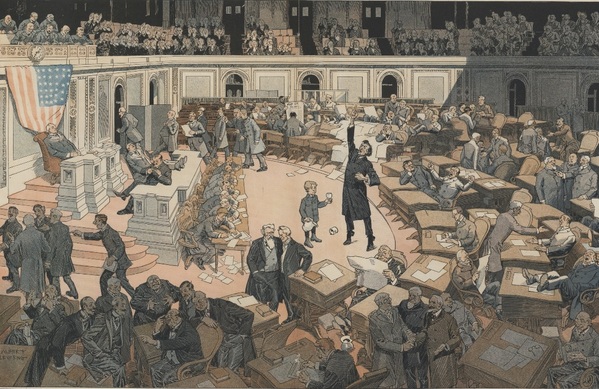
–>
November 17, 2022
I was serving on the staff of the Republican Research Committee, part of the GOP House leadership structure in 1994 when the party won control in the midterm elections during Democratic President Bill Clinton’s first term. I continued to serve on Capitol Hill for the next five years before leaving to work for conservative think tanks. The Republicans lost control of the House in 2006, foretelling their loss of the White House in 2008, but won the House back in the 2010 midterms. I returned to Capitol Hill with the House Foreign Affairs Committee (HFAC) as the party rebuilt its staffs. All members have the same office budgets regardless of party. The key is the control of the committees which set the agenda, draft major legislation, and hold hearings. The majority party has double the committee staff positions versus the minority party, meaning the capacity to get work done is more substantial than the mere balance of seats.
‘); googletag.cmd.push(function () { googletag.display(‘div-gpt-ad-1609268089992-0’); }); }
There is plenty of work to do, as a fundamental role of the Legislative branch is to exercise oversight of the Executive branch and to assure that the money appropriated is spent in the ways intended and that executive actions adhere to what has been authorized. In divided government it is an enormous and vital task.
Newt Gingrich is properly credited with crafting the Contract with America strategy that won a GOP House majority for the first time since 1952. He also modernized operations with the introduction of the Internet and cell phones to offices and staff. Unfortunately, in line with the false economy of cutting “Big Government,” he reduced staff positions across the board as if the Republicans didn’t have enough to do. This weakened the Legislative branch. His argument was that we could not cut the Executive branch if we were not willing to bite the bullet ourselves. Yet, despite its control of the purse strings, in any modern state of a major power, “energy in the Executive” backed by the massive Federal bureaucracy and the “bully pulpit” makes for a Presidential system. Congress can only serve as a “check and balance” to it.
There will be the temptation to do as the Democrats did after the election of President Donald Trump; declare “Resistance” and oppose everything, even policies they had championed themselves in the past. President Trump believed he could work in a bipartisan fashion on issues like trade reform and infrastructure but was stonewalled by a party that did not want to give him any victories and feared (particularly on trade protection) that he would steal their blue-collar base which was already being alienated by perverse social policies. Such an attitude put party ahead of country, a position made explicit by left-wing intellectuals who denounced “nationalism” as “fascism” and denied America could be made great again because it had never been great to begin with. In contrast, Republicans are a loyal opposition.
‘); googletag.cmd.push(function () { googletag.display(‘div-gpt-ad-1609270365559-0’); }); }
One issue to avoid is a national abortion standard. I am an ardent pro-lifer for personal reasons as well as on principle. I am adopted. If abortion had been legal back then, I likely would not be here today. I’ve led a good life, raised by loving parents, and lament all those murdered babies who did not get the same chance. Yet, the Democrats drew strength on the barbaric side of this issue. Congressional Republicans should adhere to the Supreme Court ruling that abortion regulation is a state issue. By 2024, the rules will have been sorted out at the local level and the issue should not be as prominent.
 The GOP should concentrate on cutting federal spending given the size of the budget deficits and their impact on the economy. Inflation is the greatest threat. It can be reduced by lowering aggregate demand. The Federal Reserve can do this only by knocking down activity in the private sector, causing recession and unemployment. Congress must reduce the excess demand generated by government spending to prevent this “crowding out” effect that shifts resources to special interests at the expense of the rest of us.
The GOP should concentrate on cutting federal spending given the size of the budget deficits and their impact on the economy. Inflation is the greatest threat. It can be reduced by lowering aggregate demand. The Federal Reserve can do this only by knocking down activity in the private sector, causing recession and unemployment. Congress must reduce the excess demand generated by government spending to prevent this “crowding out” effect that shifts resources to special interests at the expense of the rest of us.
There will also need to be a redirection of spending to rebuild the military, particularly the Navy and Air Force, as the national security situation worsens. There is an amazing degree of bipartisan support for meeting the threats from Russia in the Ukraine and China across the Indo-Pacific (with an emphasis on deterring an attack on Taiwan). Incoming Speaker Kevin McCarthy triggered a backlash when he said Ukraine would not be given a “blank check.” Hopefully he meant congressional oversight to make sure funds were being spent as intended, not reduced. The valiant effort of a people defending their country from the Putin regime that sees the U.S. as its ultimate enemy is a just cause in our strategic interest. But it should not be used as cover to fund other, less legitimate projects that cannot stand on their own merits.
With a 2023 federal budget of $5.8 trillion with a $1.4 trillion deficit, it is a target-rich environment for exposing “waste, fraud and stupidity.” But national security policy is not the first place to look or even the twentieth.
When I was on the HFAC staff there was a bipartisan consensus on who our foreign enemies were, but with some reluctance among Democrats to spend the money needed to back up our positions. A strong push by the GOP in the current situation can move the Democrats along, though there will be some outliers at both ends of the spectrum. For the GOP, the danger will come when we see how many of the new members are libertarians who are opposed to doing anything that costs money. Their isolationism becomes appeasement and then they turn apologists for adversaries to reduce any perception of threat. They forget (or ignore) the basic truth in President Trump’s 2017 National Security Strategy, “the central continuity in history is the contest for power” and that we are again in an era of Great Power rivalry.
The way to handle a dangerous world is President Ronald Reagan’s doctrine of ‘peace through strength” which won the Cold War by deterring its escalation into a hot war with a vigorous rearmament program that the Soviets could not match. China is stronger than the old USSR because it abandoned communism for state capitalism. But it is still vulnerable to economic pressure. The decoupling of strategic supply chains initiated by President Trump is being continued by President Biden and should be supported because it is good for American security and long-term prosperity. It is in the same vein as energy independence. Republicans need to listen to the Hudson Institute, not the Cato Institute, when it comes to defense, diplomacy, and trade policies.
‘); googletag.cmd.push(function () { googletag.display(‘div-gpt-ad-1609268078422-0’); }); } if (publir_show_ads) { document.write(“
Though the election issues favored the GOP, the party failed to present a credible program to address them and avoid being tarred as “extremists” by critics left free to fill in the blanks with wild accusations. Going forward, a GOP House will have to make some Reaganesque compromises, funding some Democrat programs that are not entirely odious in exchange for reforms in other areas, picking their fights to delineate between the parties in accord with the decent values of most Americans. Conservatives are not ideologues, but realists who get the job done for the American people. Life is good in the vast Red areas across the heartland and can become so everywhere. The House is the perfect institution for linking successful local and national policies.
The gains this election were real, but disappointing. The GOP has the opportunity to get better, in both tactics and message, and must do so quickly because the 2024 campaign has begun.
William R. Hawkins is a former economics professor who served in Washington for over 20 years with Congressional committees and think tanks. He has written widely on international economics and national security issues for both professional and popular publications.
Image: Collection of the U.S. House of Representatives
<!– if(page_width_onload <= 479) { document.write("
“); googletag.cmd.push(function() { googletag.display(‘div-gpt-ad-1345489840937-4’); }); } –> If you experience technical problems, please write to [email protected]
FOLLOW US ON
<!–
–>
<!– _qoptions={ qacct:”p-9bKF-NgTuSFM6″ }; ![]() –> <!—-> <!– var addthis_share = { email_template: “new_template” } –>
–> <!—-> <!– var addthis_share = { email_template: “new_template” } –>







